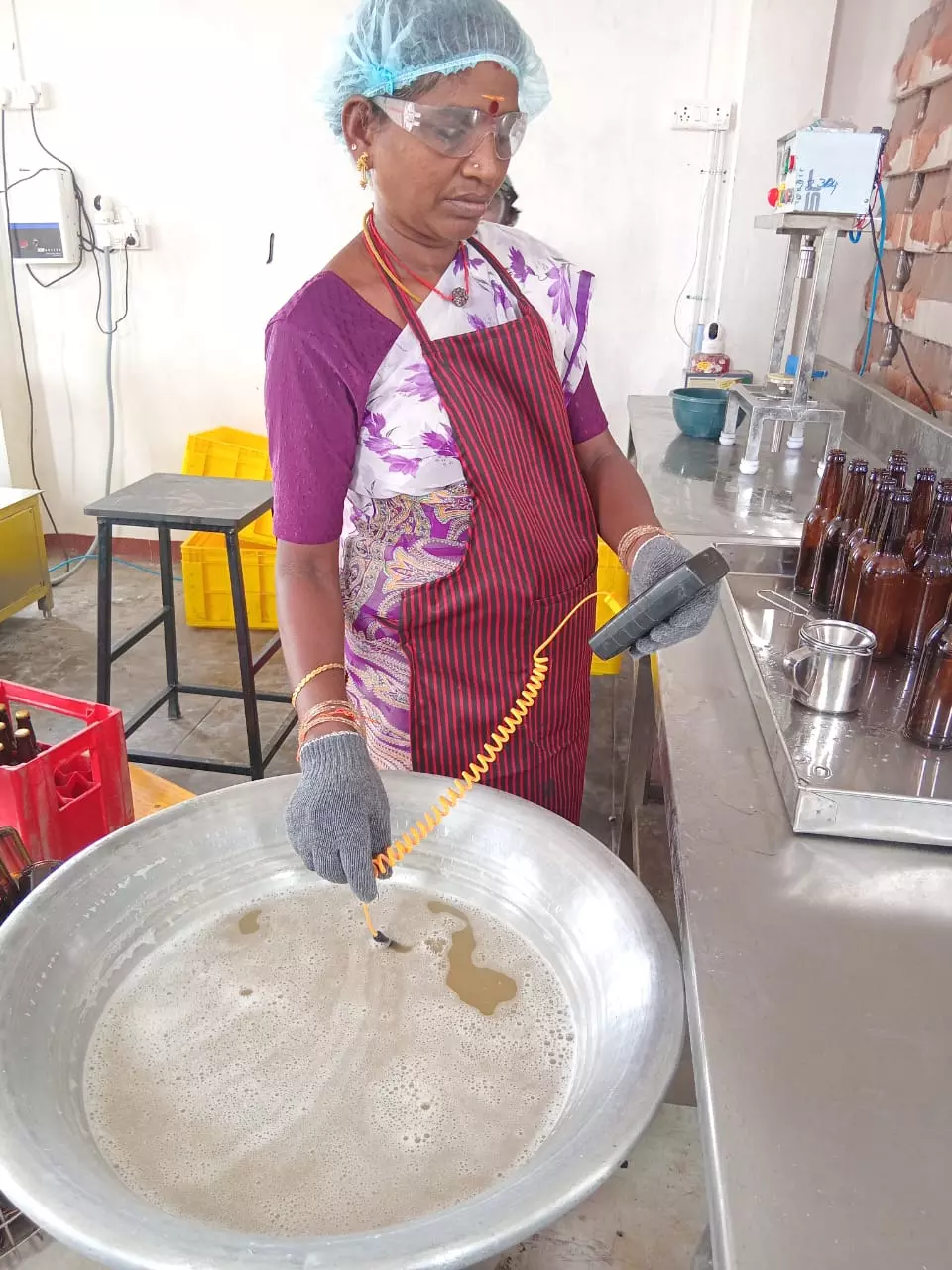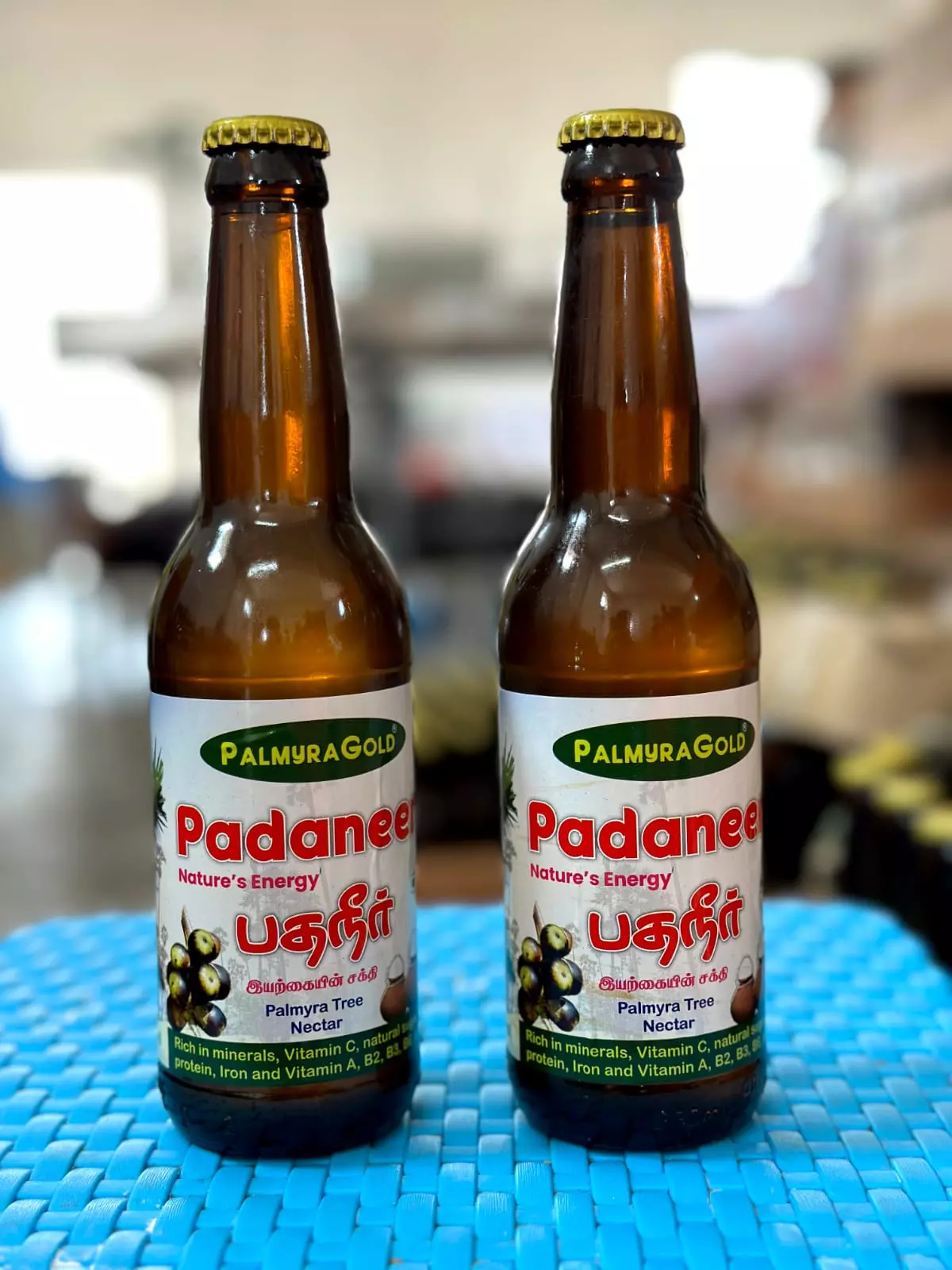
- Home
- India
- World
- Premium
- THE FEDERAL SPECIAL
- Analysis
- States
- Perspective
- Videos
- Sports
- Education
- Entertainment
- Elections
- Features
- Health
- Business
- Series
- In memoriam: Sheikh Mujibur Rahman
- Bishnoi's Men
- NEET TANGLE
- Economy Series
- Earth Day
- Kashmir’s Frozen Turbulence
- India@75
- The legend of Ramjanmabhoomi
- Liberalisation@30
- How to tame a dragon
- Celebrating biodiversity
- Farm Matters
- 50 days of solitude
- Bringing Migrants Home
- Budget 2020
- Jharkhand Votes
- The Federal Investigates
- The Federal Impact
- Vanishing Sand
- Gandhi @ 150
- Andhra Today
- Field report
- Operation Gulmarg
- Pandemic @1 Mn in India
- The Federal Year-End
- The Zero Year
- Science
- Brand studio
- Newsletter
- Elections 2024
- Events
Pulicat women bottle palm nectar, revive Tamil Nadu’s neglected palmyra trees
Nine women in Pulicat, Tamil Nadu, are turning the sap of neglected palm trees into FSSAI-certified bottled nectar or padaneer, challenging taboos around toddy, and creating a new livelihood avenue

Rajeshwari, a mother of two from Thirupalaivanam, a village located eight kilometres from the seashore town of Pulicat in Tamil Nadu’s Thiruvallur district, remembers the desperation of living on a single income. Her husband works as a daily wage labourer, and his earnings were barely enough to cover their household expenses. That changed in February this year when she joined a...
Rajeshwari, a mother of two from Thirupalaivanam, a village located eight kilometres from the seashore town of Pulicat in Tamil Nadu’s Thiruvallur district, remembers the desperation of living on a single income. Her husband works as a daily wage labourer, and his earnings were barely enough to cover their household expenses. That changed in February this year when she joined a new initiative to bottle padaneer, the sweet, unfermented sap of the palmyra tree.
“I was finding it difficult to make ends meet with my husband’s income until I received the chance to join the unit. I am happy as the job here allows me to earn a decent income each month. We collaborate as a team, and the process is simple, so there is no stress,” says Rajeshwari.
Although palm trees are recognised as the state tree of Tamil Nadu, they are frequently left unattended today, ever since the state government prohibited toddy tapping in 1986. Many palm tree-climbers gave up the trade and switched to other occupations, believing that without the incentive of toddy, the exercise was no longer worthwhile.
But in Pulicat (also known as Pazhaverkadu), a historic coastal town, a spirited group of women are bringing the palms back to life. Teaming up with male climbers, they now harvest Padaneer, package it, and sell it through organic stores in Chennai. Despite several efforts in recent years to encourage palm tree cultivation, this marks the first time in Tamil Nadu’s history that palm nectar has received certification from the Food Safety and Standards Authority of India (FSSAI).
Padaneer, derived from the palm tree, is known for its cooling properties and nutritional benefits. In contrast, toddy is the fermented, alcoholic variant of this sap, which is banned in the state. The palm nectar is harvested using a terracotta pot that is dusted with sunnambu (slaked lime). The freshly tapped padaneer is filtered to eliminate the sunnambu, then pasteurised, and stored in sanitised brown bottles. The women involved are pleased, as this new employment provides a significant livelihood opportunity for them in the remote Pulicat.

A woman worker checks the temperature of padaneer or palm nectar
It was in 2023 that the idea of bottling Padaneer first struck Xavier Benedict, an activist-architect and founder of the Art and Architecture Research Development and Education (AARDE) Foundation, a non-profit organisation based in Pulicat. A proponent of palm trees, Xavier has consistently sought to reconnect individuals with these trees, which historically played a vital role in the social and cultural fabric of Tamil Nadu.
Also read: Health ball to haute laddus: The delicious rise of India’s sweet rockstar
Since 2010, the AARDE Foundation has been producing various palm-leaf handicrafts with the assistance of women from Pulicat and its surrounding areas, providing a source of livelihood to over 150 women, mostly belonging to the fisherfolk community in the region. When the idea of padaneer materialised, Xavier did not need to search for palm tree-climbers as his palm-leaf handicraft unit already employed many.
“Following the initial trial, we submitted the sample to the FSSAI, which recognised our padaneer. This marks the first instance of bottled palm nectar being certified by the FSSAI in Tamil Nadu. It was a great moment,” said Xavier, who has been advocating against environmental degradation and various climate-related challenges in the Pulicat Lagoon, the second-largest brackish water lagoon in India after Odisha’s Chilika Lake.
When Xavier first presented the padaneer concept to the employees of his handicraft unit, the majority expressed their reluctance to bottle it, believing it to be ‘toddy’. Despite Xavier’s clear explanations that they were only bottling palm nectar, the prevailing social stigma associated with palm and toddy proved too challenging to overcome. With no alternative solutions available, Xavier was compelled to recruit women from outside specifically for the bottling of padaneer, his new initiative.
A group of nine women joined the unit in February 2025. After the initial trial, the team successfully launched padaneer in March. According to M Sathya, the team leader, the bottling process was straightforward. “The palm nectar must be heated in the same manner as milk during pasteurisation. Utilising a vacuum for bottling extends its shelf life. Once opened, it should be consumed immediately; otherwise, it will spoil,” said the 28-year-old.
Padaneer is obtained by skilled tappers who cut the unopened flower of a palmyra tree and attach a container, coated with sunnambu, to gather the dripping sap. Freshly tapped padaneer is a clear, sweet liquid with a delightful flavour. It is naturally abundant in sugars, vitamins, and various nutrients.
Also read: How Tempranillo travelled from Spanish cellars to Indian vineyards
“At room temperature, padaneer easily ferments due to naturally occurring yeast, transforming into toddy, an alcoholic drink, within a few hours, which is prohibited from being bottled in Tamil Nadu. To inhibit fermentation, a technique known as pasteurisation (heating at 80 degrees Celsius for ten minutes) is utilised. Following this, a filtration process will take place. The final product will be packaged in UV-resistant glass bottles,” said Sathya.
The unit has distributed more than 10,000 bottles (each containing 330 ml and priced at Rs 120) across seven organic shops in Chennai since March. The entire production process is overseen by women. Although the production cost of padaneer is relatively low, expenses related to bottling, transportation, and commissions at the outlets are high. “At present, we are producing only 200 litres of padaneer daily. We are looking for additional distributors to help us scale our production to a minimum of 1,000 litres per day,” said R Jayanthi, another team member.

Padaneer is obtained by skilled tappers who cut the unopened flower of a palmyra tree and attach a container, coated with sunnambu, to gather the dripping sap.
Jayanthi was employed as a recharge reminder at a telecom company, where she was earning a modest salary. A few months ago, she resigned from that position and became part of the unit. “We manage the workload among ourselves. Since the process requires only a little physical labour, we do not have to stress ourselves. However, we do not take our responsibilities lightly. We prioritise hygiene during the bottling of padanner. If we attract more customers, it will benefit people like me,” she said.
In 2020, the initiative by Viduthalai Chiruthaigal Katchi to plant palm seeds throughout Tamil Nadu received an overwhelming response. The purpose of this campaign during the pandemic was to protect the land from coastal erosion and to restore the prominence that palm trees once held in the social fabric of the Tamils.
Numerous political and non-political initiatives exist to encourage the cultivation of palm trees across the state. However, there seems to be little concern regarding the fate of those that have already been planted. Although palm trees require minimal maintenance, it is essential to monitor them during their initial growth phase after planting.
Xavier, who spent his childhood observing the palm trees along the shores of Pulicat Lake, has developed a strong bond with these trees. “We need more palm trees to combat erosion and to support our well-being,” he says, adding that, “The government support is essential for us to move forward. Padaneer should be recognised as a health drink because of its nutritional benefits.”
